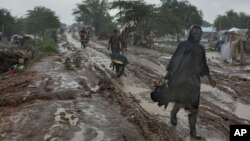A large swath of Southern Africa has been hit by a double whammy of epic floods followed by a miserly drought -- a phenomenon that has affected countless people in Malawi, Zimbabwe, and Mozambique. Meanwhile, the fledgling nation of South Sudan is in the throes of a major hunger crisis as conflict has pushed the country’s population to the brink of famine. As different as these two scenarios appear, the head of the UN’s World Food Program said both crises grow from the same roots. WFP Executive Director Ertharin Cousin, a former supermarket executive and diplomat, said the damage caused by climate change, coupled with a lack of development -- both agricultural and economic -- perpetually keep small-scale farmers on the edge. In woefully underdeveloped nations like four-year-old South Sudan, conflict feeds into that downward spiral. VOA’s Anita Powell, in Johannesburg, spoke to Cousin, in Lilongwe, Malawi, via Skype.
Q: “You’re in Malawi right now, there have been some devastating floods and some food security problems there. What’s the situation?”
A: “Well, the situation is that we’re working to address the recovering needs of those who were the victims of the flood and now we are providing support to many smallholder farmers who are trying to plant for the short winter season in hopes of addressing food security needs. Our challenge now is that we’re also now facing a drought in Malawi, which will compound the food security challenge in this country.”
Q: “How did this happen, and what do we need to do to keep this from happening again?”
A: “The global community is well aware that climate change is impacting sub-Saharan Africa. Erratic rains have become more of a reality for across the entire continent... The vulnerable people around the world need a strong global response to address the issues of climate change to ensure that we can minimize the impacts in the future. But today, what we must do is implement disaster risk mitigation strategies that will support vulnerable populations. We must build resistance, resilience in vulnerable people to climate impacts on agriculture. Over 95 percent of all agriculture in sub-Saharan Africa is rain-fed today. As long as that is the case, we know that when the rains don’t come, the crops will fail and people will go hungry. So we must begin to address these challenges in a scaled-up manner to support vulnerable people across the entire continent to ensure we minimize the potential impact from erratic rains and other challenges as related to climate change.”
Q: “We understand that you were fairly recently in South Sudan, a country that’s been grabbing headlines for its own hunger issues and food insecurity. Can you tell us a little bit about what you saw there?”
A: Well, this was my fourth trip to South Sudan in less than three and a half years. And I always say to my teams and to governments when I visit a country, ‘you don’t want me to come more than once, because that means that there’s a real problem.’ And there’s a significant problem in South Sudan. We are, today, WFP is feeding 2.5 million people in a country where three and a half years ago, we were planning for agricultural development programs, the kind of programs that we’re talking about here today in Malawi. And now we’re back to general food distribution programs in three states where they are suffering because of the ongoing conflict. I’ve met with women who walked hundreds of kilometers in search of food and safety. I witnessed one mother lose her baby after she had walked over a hundred kilometers because there wasn’t enough food for the child to eat during that period. And when I talk to these women, when I ask them what they want, they say they want peace and they want the ability to feed their children.”
Q: “One of the consistent themes that you’ve brought up, in talking about both southern Africa and South Sudan, is the need for agricultural development. Can you tell us why this is so important to you, as the head of the World Food Program?”
A: Seventy percent of the people who are food insecure in the world today live in rural areas. And if we don’t address the challenges of unproductive agriculture, we cannot add the issue the issue of food security or the issue of hunger. So we must increase the ability of smallholder farmers to scale up their agricultural yields and provide markets for them to sell those yields to ensure that we can create sustainable and durable agricultural value chains that support the food security of families, as well as the economic viability of those families. That is the only way that we are going to make progress.”
Q: Thank you so much.
A: Thank you very much for this opportunity.”




